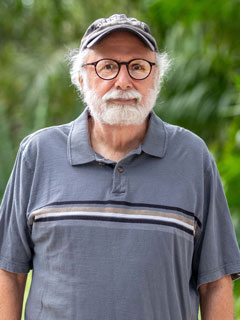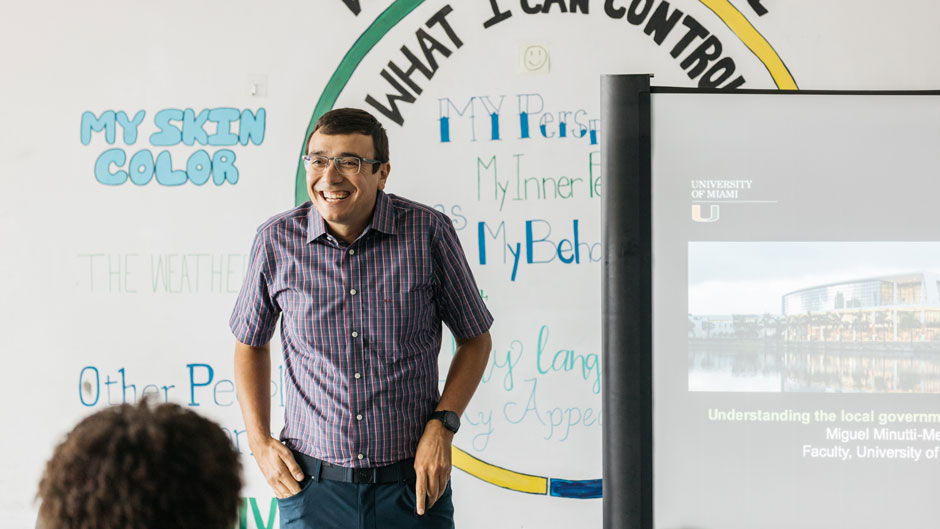When George Floyd was killed during his arrest by a white police officer in Minneapolis, his death sparked an outrage against law enforcement departments across the nation.
Many protesters called to defund police departments, which typically are a large portion of municipal budgets.
But others saw the controversy as an opportunity—one to build a greater public understanding around how local budgets are crafted.
Four University of Miami professors seized the moment. Supported by a social equity grant from the University’s vice provost for research and scholarship, they set out to educate Miami residents about where their property tax dollars were going and how they could make an impact on local budgets. Their idea sprung from research about the growing concept of participatory budgeting, a movement born in 1989 out of Porto Alegre, Brazil, with the idea that neighbors could help determine how local budgets are spent.

“One of the things we have learned is that disadvantaged communities are often marginalized in the budget process, so we want to really get neighborhood people involved in this process,” said sociology professor John Murphy, one of the key faculty members working on the project. “We want everyday people to democratize the budget process and to buy into the idea that it’s possible for them to be involved.”
Along with Murphy, the interdisciplinary team includes Scotney Evans, community psychology associate professor; Miguel Minutti-Meza and Francisco Delgado, both associate professors of business; and Mars Fernández-Burgos, graduate student. During the fall of 2020, the team researched and created a training program about participatory budgeting in Miami, along with a list of pointers for getting community-based initiatives off the ground. They also partnered with a local organization, Urban Greenworks, which works to create strong communities with more food security in under-resourced areas, like Liberty City. During the spring, six virtual training sessions were held with 12 residents from across the county who want to make a positive change in their communities.
During each training, Minutti-Meza explained the different elements of the budgets in the City of Miami, as well as Miami-Dade County. He noted that both spend about three-quarters of their general fund on employee salaries, wages, and benefits, with about 50 percent focused on law enforcement and fire departments, but that the remainder of the budgets are a bit more flexible.
“We are talking about 25 percent of the budget that is adjustable, where citizens can enter in and negotiate,” said Minutti-Meza, who chairs the Department of Accounting at the Miami Herbert Business School. “In reality, local budgets are tight. But the idea of these trainings is to spread out the concept that it’s possible for regular citizens to express their voice and to receive some government support for their ideas.”
They are hoping that the new knowledge will spur some trainees to attend budget meetings and float these ideas, and some have.
“We’ve already had two people submit proposals to the City of Miami at some preliminary budget meetings as part of the green initiative,” said Murphy, who has worked with community-based health programs in the United States and abroad.
The Miami Community Participatory Budgeting Project is now offering a one-day, in-person training to other organizations, and it even partnered on a community event this summer with Fund the People Miami, PowerU, and the Dream Defenders in Allapattah. They are working with another group called Catalyst Miami. And as word gets out, more local groups are expressing interest, said Evans, whose research team collaborates with Power U Center Social Change, which organizes and develops the leadership of Black and brown youth in South Florida. The team has also crafted a handbook to spread awareness about local budgets and how residents can propose their own ideas and gather support.
Toward that goal, Murphy attended a recent Miami-Dade County public hearing where he proposed a line item for participatory budget proposals. With some funding in place, local organizations could compete for grants to improve the community, such as adding green spaces, benches, sidewalks, lighting, or other ideas. Both Murphy and Evans are optimistic that Miami-Dade County may be open to the idea since Mayor Daniella Levine Cava has been receptive to community-led action.
Roger Horne, director of Urban Greenworks, found many of the participants for the first training program. He is now working with some individuals to craft initiatives for local, city, and county budgets and may even propose some of his own. Oftentimes, according to Horne, developers come into underserved communities, build condos, and then agree to do a goodwill project, where they aim to enhance the community, but never use local residents’ input.
“We need to let the residents who live there decide how to use those funds to improve their community,” he said. “Hopefully with participatory budgeting, we will start seeing some changes that help preserve the culture of communities here.”
Horne also hopes that the project’s first trainees will now teach others about participatory budgeting, so that the concept will become an accepted part of the fiscal process in the City of Miami, as well as Miami-Dade County.
“We need to tip the city and county budget on its head because it has stayed the same for the past 15 years,” Horne said. “If you can vote and have a voice, we need your help. That’s the only way we can make wholesale changes for everyone.”

